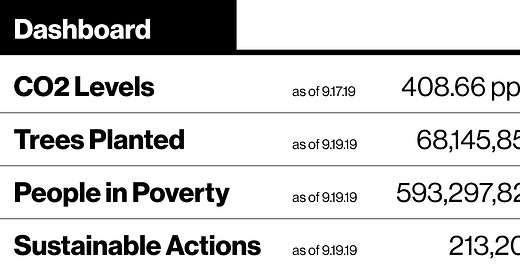⚡ Greta
Good morning! For those who missed yesterday’s newsletter, here it is.
Also, a quick reminder to like our Facebook page and follow the Instagram account if you haven’t yet!
Let’s get going.


Workplace inclusion for transgender employees
It’s estimated that over 1 million transgender people are employed in the US. In a survey of tens of thousands, 90% have said they experienced harassment due to their identity or expression and one-third said they have been fired. In North Carolina, transgender unemployement is double the US population because of discrimination and other barriers they face while on the job. Of course, it doesn’t help that the Trump adminstration has pushed to rollback protections for transgender individuals (e.g., revocation of a policy allowing students to use bathrooms consistent with gender identity).
“I was a wreck. I was a total mess. I didn’t know what to do,” Dula said. “And yet for all the stares and fear underlying that, it was still one of the most freeing days of my life.”
Driving inclusion at work: Building an inclusive workplace isn’t easy, but it also doesn’t have to be that difficult. Everyday, employers can start instituting policies that encourage conversation and acceptance. Check out this piece on The Diversity & Inclusion Revolution.
Battle: GM vs United Auto Workers

UAW: People hired before 2007 earn more than those who were hired after. That’s not fair. Pay everyone equally or we’re not showing up to work.
No one:
GM: You should pay more for health insurance.
Welcome to 2019, where healthcare is a forever-issue. Previously, employees at GM would pay 3% of their annual health-care costs, but now that number has been upped to 15%. The typical American worker on the other hand, pays about 28% of their own health-care costs. From the perspective of GM, the rise probably still feels generous, but the employees are not happy.
GM claims health-care added $1,500 to the cost of every car. In 2017, Warren Buffet suggested he’d like the US to go to a single-payer system because other countries do not place this sort of burden on their employers. They shouldn’t have to factor in their employees trip to the doctors into their pricing and bottom line. He calls these expenses “the tapeworm of American economic competitiveness.”
Outcome Prediction:

When green gets SaaS-y
For all our VC friends here, get excited for another SaaS product. Salesforce is now making it easier for companies to be more environmentally friendly. They are developing the Sustainability Salesforce Cloud to help companies track metrics like carbon emissions, renewable energy use, and more, leveraging a combination of internal and third party data. The team has been using this to measure sustainability efforts internally, and they now want to roll it out into the market (sometime next year). Please share this tool with your company leadership or CSR / sustainability officers!

Till death do us part

TLDR: Good government requires institutions that mediate between voters and state.
Democracy is hard work. And as society’s “elites” — experts and public figures who help those around them navigate the heavy responsibilities that come with self-rule — have increasingly been sidelined, citizens have proved ill equipped cognitively and emotionally to run a well-functioning democracy …
[Democracy] requires a lot from those who participate in it. It requires people to respect those with different views from theirs and people who don’t look like them. It asks citizens to be able to sift through large amounts of information and process the good from the bad, the true from the false. It requires thoughtfulness, discipline and logic. Unfortunately, evolution did not favor the exercise of these qualities in the context of a modern mass democracy (Politico)
Two common perspectives on why Trump got elected:
Too little democracy: Trump as President shows that we need to expand the power of the popular vote. He would have lost.
Too much democracy: If the GOP elites could have just chosen who they wanted to be in the primary, the outcome of Trump’s nomination would have been the same as his university’s accreditation.
What we could learn: Democracy asks a lot of the individual. Maybe too much. The answer is probably not found in giving the elites the ability to check the irrational appetites of the individuals. However, if we can define institutions that are made up of and truly represent the individual, we can force democracy to give us a better deal.


Greta Thunberg
In honor of our favorite climate activist (and all around baller) coming to New York this week, we thought we’d highlight some things you should know:
When she was 15, she took weeks off from school to protest the Swedish government for not battling climate change. This protest has grown into an international movement called Fridays for Future!
She addressed the UN and told everybody there that they weren’t mature enough to tackle climate change … again, at 15
She was named on Time Magazine’s 2019 list of the 100 most influential people in the world and has been nominated for a Nobel Peace Prize
She met with President Obama on Tuesday to discuss climate activism, and he tweeted about her!


Did we mention that she was just 15 when she started doing this?
Tomorrow, at the ripe old age of 16, she’ll be leading a climate strike in NYC (see our events below) and will be addressing the UN at the Climate Action Summit next week!


Trick Mirror by Jia Tolentino
“And here one of the most soul-crushing things about the Trump era reveals itself: to get through it with any psychological stability—to get through it without routinely descending into an emotional abyss—a person’s best strategy is to think mostly of himself, herself. As wealth continues to flow upward, as Americans are increasingly shut out of their own democracy, as political action is constrained into online spectacle, I have felt so many times that the choice of this era is to be destroyed or to morally compromise ourselves in order to be functional—to be wrecked, or to be functional for reasons that contribute to the wreck.”
Here’s also a great interview of her by FT Culture Call: Listen to podcast.

UNGA Events: Check out all the amazing events happening around the UNGA Assembly in New York City! Many of them are public, so if you have time, we definitely recommend checking them out.
How to Build a Global Community in a World of Nationalism?: What could globalists learn from the powerful sense of belonging that nationalism has created? Faced with the injustices of the world's economic and political system, what should a responsible globalist do?
Digital Global Climate Strike: This September 20th, millions of people will join young climate strikers in a Global #ClimateStrike on the streets and demand an end to the age of fossil fuels. Anyone with an online presence has an opportunity to join in and “go green” with a digital strike.
If you’re in NYC, the strike will start at Foley Square (Centre and Worth) at 12pm EST on Friday. See you there!
If you like what you read, please click on the heart below & continue sharing this newsletter!
Tomorrow is a daily impact newsletter for changemakers who care about the world. Our purpose is to bring you the news and stories about people making a difference.


